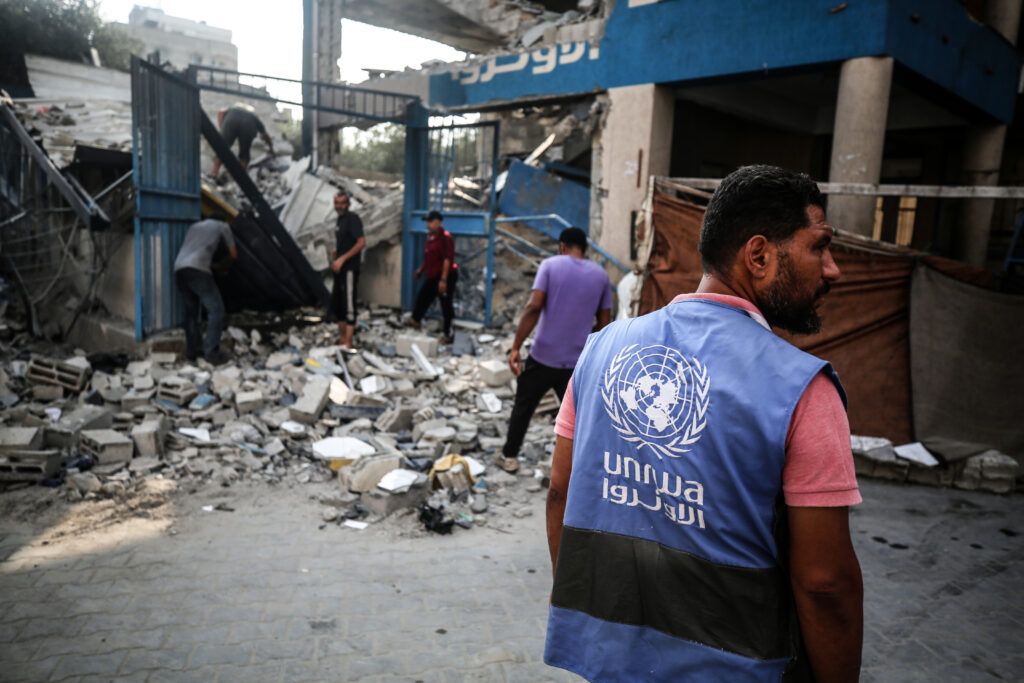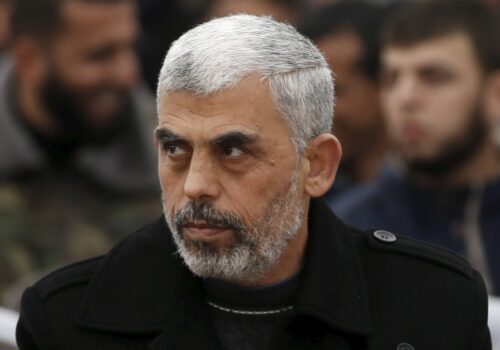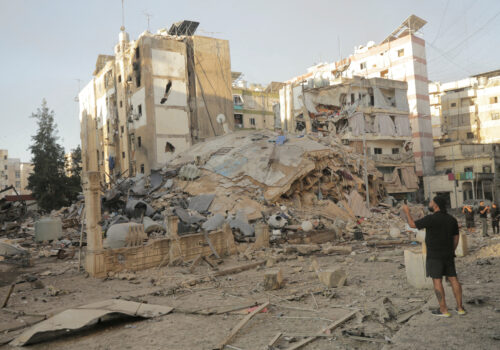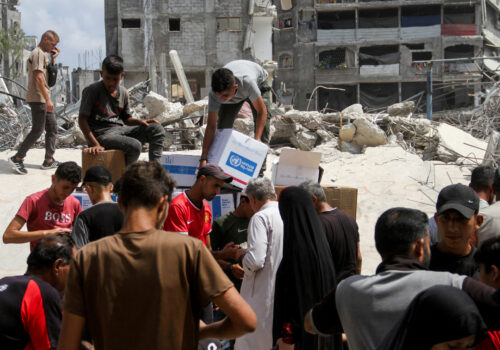How to reform UNRWA to improve Palestinian lives and Israeli security
Over the past month two developments unfolded that together capture Israel’s predicament with the United Nations Relief and Works Agency for Palestine Refugees in the Near East (UNRWA). First, a top Hamas commander, killed in combat in Lebanon, was revealed to be an UNRWA employee on administrative leave—signaling, once again, the involvement of local UNRWA staff in terror activities against Israel. Then on Monday, the Knesset approved two bills: one banning UNRWA’s operation in Israel, and another outlawing any communication between official Israeli representatives and UNRWA personnel.
These developments highlight, once again, the question of what needs to be done with UNRWA now and when the war is over. To place this dilemma in context, it is worth noting that an unspecified number of UNRWA staffers appear to have been involved—to differing extents—in implementing, supporting, promoting, laying the educational groundwork for, and celebrating the Hamas-led massacre of Israelis on October 7, 2023. In addition, Hamas tunnels have been discovered under UNRWA premises, at least one of which used UNRWA’s information technology infrastructure and electricity for its operation, and in multiple cases ammunition piles and sniper positions were discovered in or in close proximity to UNRWA facilities.
Indeed, these developments led almost twenty countries to freeze their contributions to UNRWA at the beginning of the year. In March, however, amid a dire and deteriorating humanitarian situation in Gaza, some of the states began walking back their funding freeze. In April, the United Nations-commissioned Review Group investigation, led by former French Foreign Minister Catherine Colonna, highlighted substantial breaches in the agency’s neutrality and fleshed out no less than fifty recommendations to improve it.
This leads us to the current point: a humanitarian disaster in the Gaza Strip, an UNRWA that is perceived by the international community to be “the backbone” of humanitarian aid in Gaza, and an Israeli ban to work and communicate with UNRWA given some of its employees’ direct involvement in militant activity against Israeli citizens.
Against this background, we propose a three-point plan that provides a pathway for reforming UNRWA to truly service Palestinians and to no longer pose a threat to Israel and an obstacle to Palestinian statehood negotiations.
Step one: Strengthen and support organizations already active in Gaza
UNRWA-Gaza’s workload is already being disbursed among dozens of organizations on the ground. According to Israeli sources published in October, UNRWA-Gaza is responsible for donating 17 percent of humanitarian aid, compared to 33 percent by the World Food Program and 20 percent by the Egyptian Red Crescent. Other organizations sharing in the workload include Chef José Andrés’s renowned organization, World Central Kitchen, UN Office for Project Services, and the UN International Children’s Emergency Fund (UNICEF).
As a first step, in the remaining three months until Israel’s new bill takes effect, concerted international efforts to strengthen and support these and other organizations already active in Gaza is essential. This is the best way to simultaneously mitigate the humanitarian tragedy in the Gaza Strip, while undermining UNRWA’s traditional monopoly over services in Gaza and the relationship UNRWA has with Hamas. As part of this effort, states donating to UNRWA should match their contributions with donations to additional humanitarian organizations working in the Gaza Strip, and Israel should establish efficient communication lines with them as a base for facilitating future cooperation.
Second, UNRWA facilities must be better safeguarded. The April Review Group report notes that a limiting factor to discovering critical breaches in UNRWA’s involvement in terror is that UNRWA, as a UN agency, does not have policing, military, or wider investigative capacities or competencies required to detect such breaches. This is not a new problem: then UN Secretary-General Ban Ki Moon noted the abuse of UNRWA facilities for terror activity against Israel as far back as 2015.
Here, UNRWA donor states can step in by providing at least two officials from national bureaus with investigative experience and second them to a temporary task force responsible to the member states and the UN secretary-general, not to UNRWA. The task force would report monthly on the state of the relationship between UNRWA officials and terrorist organizations in Gaza.
Finally, in the next three months—before the Knesset bill takes effect—UNRWA-Gaza should take concrete and visible steps to begin implementing policy recommendations noted in the Review Group’s report. An underlying problem that is prompting many of those recommendations stems from the fact that of UNRWA’s 32,000 staff, 0.8 percent are international and 99.2 percent are local.
The UN and member states must immediately work to begin remedying this severe imbalance across the UNRWA hierarchy—hand in hand with Israel, which will need to approve working visas for international personnel. Failure to do so is almost certain to slow meaningful progress to reform UNRWA’s operational and functional efforts in Gaza. For example, the Review Group report points out that staff unions, which include virtually all local hires, are noted for employing intimidation tactics and threats, including against UNRWA management, enabling them de facto control of delivery and project implementation. Moreover, this atmosphere explains UNRWA’s lack of desire to partner with other on-the-ground organizations—despite UNRWA’s 1949 founding resolution that calls for such cooperation. This is because staff associations perceive “partnerships as the beginning of the dismantling of UNRWA,” choosing to prioritize UNRWA’s own survival over that of the population it is supposed to serve.
Additionally, this extreme ratio of local to international staff produces a culture within UNRWA that is, according to the Review Group, “resistant to modernization and reform.” Finally, it has created an environment whereby UNRWA itself struggles to staff positions designed to keep the agency’s checks and balances in place. This is demonstrated by one of the report’s findings noting that UNRWA’s Ethics Office needs to be “strengthened urgently.”
Step two: Focus on education and health over the next two years
Education and health services comprise almost three-quarters of UNRWA’s budget, yet these services do not appear in UNRWA’s mandate and are traditionally provided to citizens by states. In the case of UNRWA-Gaza, the fact that the international community, through UNRWA, channeled funds to both these basic state services freed up resources for Hamas’s terror activity.
In the education realm, the creation of a multi-state steering committee is needed. Its role would be two pronged. First, it would oversee and monitor the compliance of UNRWA’s educational system with principles of neutrality, all the while identifying suitable partner organizations—local and international—to support and begin collaborating with UNRWA schools. These schools have a longtime record of incitement against Israel and must be subject to randomized classroom inspections and annual textbook inspections by representatives of donor states (not UNRWA). The United Arab Emirates has updated its curriculum in recent years to include lessons on the Holocaust. Saudi Arabia recently went a long way in removing anti-Semitic language. The committee should work with UNRWA to leverage these models for textbooks, perhaps by marrying the changes with more traditional international educational curriculums.
A second, follow-on stage would see the steering committee help oversee the handover of UNRWA’s education budget to partner organizations or, preferably, post-Hamas Palestinian state education bodies. A guiding principle would be to allow UNRWA to focus on humanitarian assistance and neutralize the potential for competition between UNRWA and an aspiring Palestinian state over educational resources and authority. This could best be done by ensuring a burgeoning Palestinian civilian government in Gaza, or if that is not possible, multiple organizations with educational expertise, such as UNICEF, the UN Educational, Scientific and Cultural Organization (UNESCO), or international nongovernmental organizations, to be given authority to oversee Gaza’s education.
Health facilities should operate through a similar method of direct international funding to an on-the-ground skilled staff, with an oversight mechanism controlled by international donors. Such a set-up would enable reporting of on-the-ground staff if facilities were abused for terror. It would also ensure that statistics echoed by such institutions are not tampered with and correctly reflect the situation on the ground. All this should be done during a tentative, predefined period in which a post-Hamas civil administration or Palestinian institutions prepare to assume responsibility for Gaza’s healthcare. Once the transition is made, healthcare will be based on equal rights and access for all, without differentiating those whose ancestors were refugees.
Step three: Redefine UNRWA’s mandate
In December 2025, UNRWA’s periodic mandate is due for a vote in the UN General Assembly. The resolution brought to the vote should shift the agency’s responsibility from supporting all Palestinians defined as refugees, to instead supporting all Palestinians from the poorest socio-economic strata, regardless of their refugee status.
Such a move would complement steps to create a cohesive Palestinian society in an aspiring Palestinian state by terminating artificial differences between Palestinian refugees and nonrefugees who live in the same space in the West Bank and Gaza Strip. While such a step will encounter obstacles, it can happen if a coalition of UNRWA’s largest funders (the United States and Germany, among others) spearheads a group of states that includes Palestinian representation to change, not end, UNRWA’s mandate.
This is a unique moment in which a reformed UNRWA can be given new life in a win-win situation for Israelis and Palestinians. Now is the time to set the process in motion.
Michal Hatuel-Radoshitzky, PhD, is a senior advisor and program director at MIND Israel. She is an adjunct lecturer at Tel Aviv University and a founding member of Forum Dvorah: Women in Foreign Policy and National Security.
Jonathan Panikoff is director of the Scowcroft Middle East Security Initiative at the Atlantic Council and a former deputy national intelligence officer for the Near East with the National Intelligence Council.
Further reading
Thu, Oct 17, 2024
Experts react: Yahya Sinwar is dead. Here’s what’s next for Hamas, Gaza, Israel, and the Middle East.
New Atlanticist By Atlantic Council experts
Israel confirmed on Thursday that it had killed the Hamas leader. Atlantic Council experts share their insights on what this means for the immediate conflict and beyond.
Tue, Oct 22, 2024
The economic and social costs of the war in Gaza
Report By Perrihan Al-Riffai
After a year of war, Israel, the Palestinian territories, and neighboring countries need a permanent ceasefire. But with development gains erased, billions of dollars in infrastructure damaged, and skyrocketing unemployment, the Middle East also urgently needs a solid reconstruction plan.
Thu, Oct 24, 2024
Tragic death of aid worker underscores Gaza’s postwar challenge
MENASource By Alicia Nieves
The international community has long been criticized for its inaction as Hamas gradually tightened its control over NGOs and civil institutions.
Image: A member of the United Nations is checking the destruction at a school run by the UN Relief and Works Agency for Palestine Refugees (UNRWA) that was previously hit by Israeli bombardment, in the Nuseirat camp in the central Gaza Strip on July 15, 2024, amid the ongoing conflict between Israel and the Palestinian armed group Hamas. (Photo by Majdi Fathi/NurPhoto)





